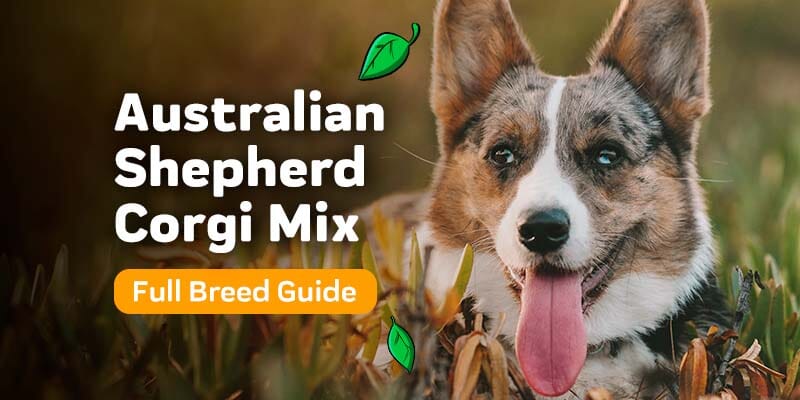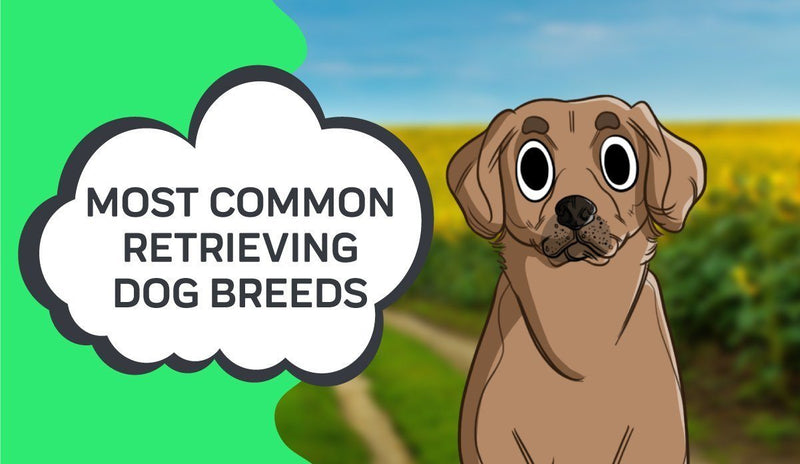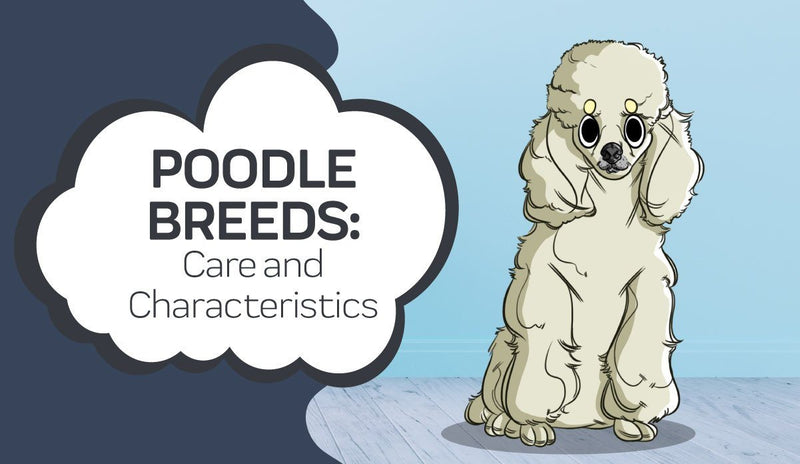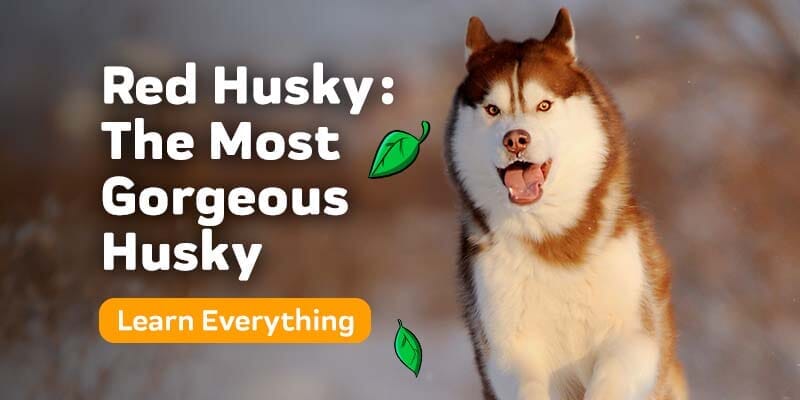The Australian Shepherd Corgi Mix is a mixed breed dog that's a combination of two herding dog breeds. The parent breeds are the Australian Shepherd and the Welsh Corgi. This means you should expect everything that comes along with herding breeds with this mix breed.
While many herding breeds make for wonderful family dogs, they need the right type of owner to fulfill their needs. Let's explore who that is, and if a Corgi Aussie mix is right for you.

The Australian Shepherd
Unlike the name suggests, these adorable pups are not an Australian breed. These medium-sized dogs actually hail from America.
What their exact origins are is up for debate. Some say they originated from various dog breeds that the Basque people from the Pyrenees region of Spain brought over when they settled in the American West.
Others say they descend from several breeds that came from Australia, with Australian immigrants relying on them for help herding sheep. Which is true is hard to say, and possibly the Australian Shepherd is a combination of both Spanish and Australian dog breeds.
One thing that can be mistaken is their very American origins as ranchers in the higher regions of the Western US, discovered that they did very well in the arid and thin air of the region.
The States is also where they gained immense popularity after their herding instincts and skills were highlighted via the rodeo circuit, which got them some airtime on television.
Breed Personality Traits
The Australian Shepherd is a happy-go-lucky dog with a ‘can do’ attitude. This purebred dog treats works as if it was playtime. They bond with their caretakers deeply and are loyal, affectionate, and ready to go whenever you are.
They can be somewhat leery of strangers, though they aren’t known for aggression. Because they are a herding breed, they tend to be well-behaved and take well to training.
The Herding Instincts Of The Australian Shepherd
Australian shepherds are excellent herding dogs. They will herd the children, ducks, sheep, you name it! They may even try to herd the vacuum cleaner or the lawn mower.
This is a dog that requires a lot of exercise or they get bored easily. They’re very intelligent and need to be mentally stimulated as well, or they will find destructive ways to channel their needs.
They are good with children and other pets when they are well-socialized and taught as pups not to nip at children and other smaller creatures around the house. Nipping is a herding instinct for many of the herding breed dogs, but they can be taught when not to do this. It’s important that you work on this from day one.
While Australian Shepherds excel at obedience, their herding nature, intelligence, and size easily make them one of the most demanding dog breeds to care for.

Caring For the Australian Shepherd
Grooming
The Australian Shepherd is known for their very thick coat that needs constant grooming and brushing. It's important to avoid needing to shave the Australian Shepherd. It helps keep them safe from thistles and other pointy plains that they can come across. As well, their coat helps insulate them from the heat in summer as much as it keeps them warm in winter.
If they are groomed professionally, they will receive a good blow-out of their coat and may receive a trim on their backside and the backs of the legs.
All-in-all, if you don’t like brushing dogs and hate shedding, then this may not be the breed for you.
Training and Exercise
You will need to train your Aussie so that they are under your control at all times. It’s important that they not pull on a leash because they are a relatively heavy dog, and are considered a medium to large breed.
This breed is prone to depression and anxiety issues if they are not exercised often and worn out well. They like to run and play a bit on the rough side. They were, after all, bred to herd cattle and sheep. A bit of jostling is normal to them, so it's good not to be timed.
If they have plenty of mental and physical stimulation, they won’t be hole-diggers, barkers, or worse. They tend to be very calm and curious dogs, with plenty of supervision and training. They are rock solid and obedient.
Other Essentials To Caring For the Australian Shepherd
Make sure that you feed them a optimal diet, keep their teeth clean with a toothpaste made for dogs, and provide them with plenty of water at all times.
It's good to check their feet if they have been outside for a while, whether that's due to work or play.
While they aren’t necessarily known for being prone to ear infections, you should check their ear weekly and make sure that they are kept clean and smelling good. A pungent odor can indicate a yeast infection in the ear and a black tar-like substance in the ear may indicate ear mites. Keep an eye out for these.
Overall, the Australian Shepherd is a fantastic, intelligent breed that is loyal and loving. They love to play and work hard and they seem to have a sense of humor.
You’ll find yourself giggling at their antics and their exuberance for life. Aussies smile a lot and will have you smiling right along with them.

The Corgi
This is another herding breed dog who is so old that no one actually knows exactly what their origins are. Depicted in very old works of art, the Corgi is popular in Europe as a sheepherder. They were also a beloved breed of the former Queen of England. There are two types of Corgis. The Pembroke Welsh Corgi and the Cardigan Corgi. The Pembroke is the most popular and often has an absent tail.
Corgis are a spunky and intelligent dog that often have a mind of their own and a strong will. This serves them well most of the time and it makes for a personality that is very lovable and favored by their owners. They are very competitive and active.
Like the Australian shepherd, they have a double coat, i.e., that means your furry friend, the Corgi Aussie Mix will likely have one as well. So again, make sure you are OK with dog hair.
Don’t be fooled by their short legs, the Corgi is a fast-moving little dog that has a thick torso, making them quite resilient as well. They won’t be pushed around and like doing the pushing themselves.
As a smaller dog in the herding dog group, they’ve got a thing or two to prove and almost seem to have a natural tendency to want to be first at things, top finisher, and the winner, even if the goal was out-eating their siblings. This makes them an excellent working dog for the farmer with a flock that needs tending.
Corgi Personality Traits
We’ve already touched on some of the traits of this breed. They have an opinion about things and aren’t afraid to show it most of the time. The Corgi is feisty and loves a good chase or a round of fetch.
They need exercise or they can be quite naughty. Corgis are prone to a lot of barking if they are bored and/or untrained.
The Herding Instincts Of The Corgi
Corgis are alert, with a keen sense of hearing and smell. They are a fearless little dog that is willing to tangle with raccoons, opossums, and possibly even a bobcat if you were to let them. Their small size allows them to avoid being kicked by larger animals when herding, meaning they are not afraid to take on animals much larger than them. Most dogs aren't anywhere as big as sheep, and Corgis are known to herd animals as large as horses and cows.
This may be a good reason to train them to be obedient (at least as obedient as a Corgi will be). Don’t get us wrong, they are great dogs and naturally get along with other dogs. They are simply prone to doing things the way they want to do them thanks to their incredible confidence.
If you don’t display to them very early on that you are the one in charge, the Corgi is a breed that can easily take over, empowering themselves to make executive decisions on your behalf, deciding who can come in the front door and what to bark at in the courtyard.
Corgis adore attention and children. They’ll play all day long if there are children to play and run with. Do be cautious about the nipping which is a herding dog trait. Nipping is how they herd things as it allows them to control the direction of the animals they are charged of.
They often attempt to herd children and can accidentally nip skin and cause bleeding if this is not curtailed at a young age. Kids should be taught that sapotaceous running and creating a hectic environment can set off the Corgi and their desired herding instincts.
Involving a trainer to help with these sorts of issues is always the best idea. Begin working right away and involve children in the training process so that they understand what triggers a herding dog to nip at ankles and flailing arms.
Lastly, don’t leave the dog and children alone. This is a high priority. Never leave children and dogs unattended until children are old enough to be completely in control of situations and the dog has been trained.
The Corgi is also quite the ham and if they are getting attention for being a goofball, they'll continue to be so. They love being the center of attention and learn very quickly what gets them treats. Any dog will repeat the behaviors that work in their favor and Corgis catch on quickly.
In total honesty, herding breeds tend to be some of the most intelligent dog breeds that exist, but some of the hardest to care for. This is likely because they need to be able to quickly think on their feet and short legs.
This ability to anticipate another animal’s behavior is a cognitive function that many never thought that dogs were capable of.
Duke University has a program dedicated to canine cognitive function and they’ve proven that dogs have the ability to reason and plan. Dogs with herding traits may have the aptitude of a child who is roughly five years old.

Caring For The Corgi
Grooming
Corgis have a very similar coat to that of the Australian Shepherd. It’s thick and designed to keep thistles, thorns, and other weeds from penetrating their skin. I.e., expect regular grooming.
Corgis typically shed excessively in the spring but are known to shed a little year-round, so if you have allergies or hate dog hair, think hard about having a Corgi and their mixes.
Training and Exercise
An untrained Corgi can be an out-of-control dog that barks a lot. Their care includes proper training. If you are unsure where to begin, hire a trainer or attend group classes that additionally help socialize your dog. A well-socialized Corgi is a well-behaved Corgi.
Other Essentials To Caring For The Welsh Corgi
Like other herding breeds, the Corgi breed does best when on the best of the best dog foods, especially ones that promote a healthy weight. Pay attention to their teeth. The Corgi may chew on toys more than the Australian Shepherd, so they will need some bones or other hard chews to help keep their teeth clean and healthy.

Potential Health Issues of Both Parent Breeds
Here are some health concerns that you should be aware of with both breeds:
The Australian Shepherd
-
Two blue merle Aussies should NEVER be bred to each other. A dog that inherits the blue merle gene from both parents will be either deaf or blind, and in many cases, both.
-
Cataracts - A growth over the cornea that causes a loss of vision that happens gradually. This is treatable with surgical intervention.
-
Hip dysplasia - A condition that causes the femur to not sit properly within the hip joint. It floats in and out of the joint, causing discomfort and pain. It can cause stress to the ligaments, arthritis, and long-term joint damage. Pain medication is typically prescribed and surgery may be required in severe cases to prevent a dog from being rendered permanently lame. Medium-sized dogs and larger are more prone to developing hip dysplasia.
-
Epilepsy - Australian shepherds are at a greater risk of inheriting primary epilepsy, which results in seizures that may require lifelong medication to control.
-
Caution with Heartworm Medication - Due to a mutation with their MDR1 gene, herding breeds are more sensitive to all heartworm preventive medications. Any dog can be tested for the gene, which they can have up to 2 copies of. This does not mean you shouldn't give your dog heartworm medication unless your vet recommends it. Even dogs with two copies can typically tolerate low dosages. The risk of dying from heartworms is greater than the risks of low doses, and there is no holistic alternative for preventing heartworms.
The Corgi
-
Hip dysplasia - Due to their unique shape, unlike many small dog breeds, the Corgi is prone to hip dysplasia where the ball (head) portion of the upper thighbone doesn't sit comfortably in the hip joint.
-
Von Willebrand's disease - This is a curable condition that is passed genetically in Corgis. It may require a blood transfusion and ongoing treatment to beat the condition, but it doesn’t mean a death sentence. It is evidenced by bleeding gums and excessive bleeding after heat cycles.
-
Degenerative myelopathy - This is a condition in which the tissues in the area of the spine that provide support degenerate. It is a progressive and debilitating disease. It can progress fast and can lead to total paralysis in the hind limbs.
-
Intervertebral disc disease - Characterized by herniated and bulging discs. Don’t let your Corgi get overweight and take care of his back. If your Corgi is refusing to jump or attempt to go up and down stairs, they may be showing early warning signs and you should have them checked.
-
Epilepsy - This is a condition that is typically passed genetically. Many breeds are prone to this condition and it can be life-threatening if it isn’t treated. Many animals respond well to treatment, however. Vet your dog immediately if you suspect they had a seizure.
-
Cutaneous Asthenia - Also known as Ehlers-Danlos Syndrome, this is a condition in which the skin appears flimsy and lacks elasticity. The dog may bruise or bleed easily and the skin may appear to sag.
-
Cystinuria - Typically, only occurring in males, this condition causes excessive levels of protein in the urine which can lead to kidney stones, bladder stones, and UTIs. It can be very painful and irritating to the dog.
-
Patent Ductus Arteriosus - This is a congenital defect that can be corrected with a surgical procedure if discovered by your veterinarian upon exam. It causes the unoxygenated blood to bypass the lungs, leading to high blood pressure.
-
Cataracts - The eyes get an opaque film that grows over the cornea which leads to blindness and vision issues. This can be corrected by surgically removing the cataract. Vision prognosis is very good. It should not be confused with lenticular sclerosis or nuclear sclerosis, a condition that causes a dog's eyes to turn blue and hazy). It's typically a harmless condition that many older dogs experience.
The Australian Shepherd Corgi Aussie Mix
Whenever there is a first-generation mixed breed of pups from each of the purebred parents, the puppies have a 50/50 chance of looking like either parent or being an equal mix of both. Your Corgi Aussie Mix may have an almond-shaped head like the Pembroke Corgi, or they could have the medium-sized tail of the Australian Shepherd. In some cases, when two recessive genes are passed, the pup may look different than either parent.
Typically, the mix of these dogs will be short-legged like the Corgi and coloring of the Australian Shepherd, which may be black and white, black-tricolor, red-tricolor, red and white, red merle, or blue merle. If the Australian shepherd parent carries the merle gene, there is a good chance it descends to the litter. A blue merle Corgi Aussie mix will likely bring a higher asking cost when buying from reputable breeders.
The Herding Instincts Of The Australian Shepherd Corgi Mix
Since both the Australian Shepherd and the Pembroke Welsh Corgi are herding dogs, the Corgi Aussie Mix need to herd will likely be strong. A Australian Shepperd Corgi Mix that comes from a line of show dogs will have fewer herding instincts.
An Aussie Mix that comes from a line of working dog lines will likely have an intense desire to herd. You may notice they keep their toys together and display nipping and chasing behaviors very early on.
It’s important that start training these puppies as soon as they come home. It is never too soon to begin training. If you don’t know where to start, hire a professional trainer who can come to your home and help you see what needs to happen. They will get you started on how to correct the behavior and redirect it constructively. Training classes are also available.
Herding dogs are very intelligent, and your Aussie Corgi mix is no exception. They will be very sharp-minded and catch on quickly to training. These guys excel at agility, frisbee, flyball, and other dog sporting events. If you are an active person or have an active family and lifestyle, these dogs will absolutely thrive with their human family.
What To Expect From Your Corgi Australian Shepherd Mix
These dogs are both loving and affectionate, as well as loyal to the end. Both parent breeds will stand by your side through thick and thin, ready to do whatever you ask of them. The Aussie Mix prefers being with you whenever they are given the choice. Herding dogs bond very closely to their pack and they view you as such.
Don’t expect your herding dog to be lazy and lay around the house all day without having something to say about it. They need to be active or they will become destructive if they aren’t given enough play time. As a medium-sized dog, they can cause a lot of damage quickly.
While the Aussie isn’t a big barker, the Corgi can be. You’ll want to work with your puppy immediately if they begin exhibiting signs of barking excessively. It can turn into a non-stop thing that neighbors will despise you for, especially if you live in an apartment building.
Herding dogs typically learn to walk on a leash with ease as long as you are consistent. While highly intelligent dogs often take well to training, if you aren’t consistent, then they see your weak points and they will take advantage of them.
They can’t help it, it’s what many working smart dogs do. They herd animals by finding their weak points and using that fear against them to move them.
They’ll have you figured out faster than you will train them, meaning you'll want previous experience with training a dog. When it comes to longevity, you can expect a fairly healthy breed with an average lifespan between 12-15 years of age. They will remain active for the majority of their life, though they do slow down some with age.
In their old age, they may lose their hearing and their eyesight may fail. They’re incredibly adaptable and will learn to get around as long as you help them. They are tough and resilient, adaptable, and rarely get down. They are happy little dogs, but they are not for the faint of heart.
Reasons That You May Wish to Avoid an Australian Shepherd Corgi Mix
-
Health issues that were listed above. They may have a high risk of inheriting a potentially progressive issue that will lead to expensive surgery or long-term care needs.
-
Nipping is hard to train out of this mix because the genetics are just hard to beat. If you have children, herding breeds are very difficult to have because kids get nipped. Don’t have a herding dog with very small children unless you are already very experienced with them.
-
This mixed breed is NOT a good choice for first-time pet parents. Corgis are willful and the Australian Shepherd has high energy demands. Then both breeds are intellectual, meaning they need near-constant mental and physical stimulation.
-
High exercise needs. If you live in an apartment or you are not an active person, this dog will leave you defeated. They can easily become destructive and depressed when their needs are satisfied.
-
Lack of an outdoor space for running would be a deal breaker with this dog. If they can’t run, they won’t stay happy or healthy.
-
While the Corgi Aussie Mixes are wonderful dogs, it's important to understand that are not able to register them with the American Kennel Club. However, hybrid dog registry groups like the American Canine Hybrid Club and International Designer Canine Registry do recognize many mixed breed dogs and the Corgi Australian shepherd mix is one of them!
While they are smart and loyal, they can also be a challenge, and only you can really determine if you are up to that challenge. Talk to a breeder and ask them a lot of questions. Talk to trainers ahead of time. Find out what you can do to start successfully if you decide that you simply have to have an Aussie Corgi mix.
Final Words On The Aussie Corgi
While the Corgi Aussie mix is a beautiful dog, they aren't the right dog for most people. Whatever you do, understand that it is on average a 12 to 15-year commitment when you bring home that puppy that has very high needs.
If you decide that the Corgi Aussie mix is the perfect companion, then we wish you many years of love and happiness with your best furbuddy. When in the right home, these dogs truly thrive and can bring years of everlasting memories.
Featured Image Credit:
Erin Smith (Spiritbearstudio@gmail.com)
















